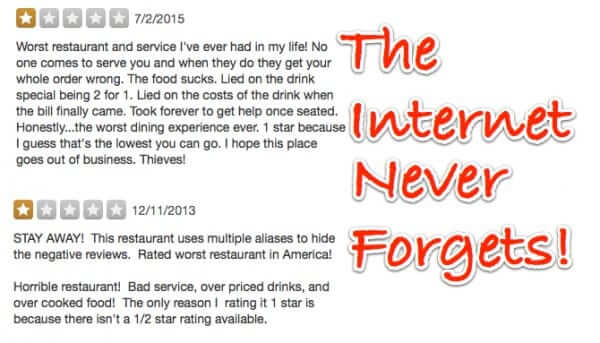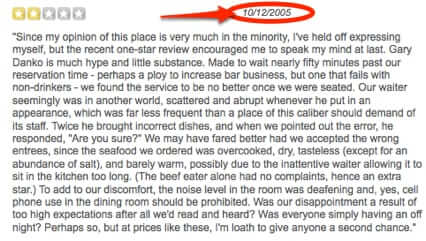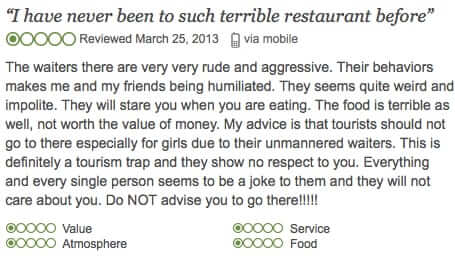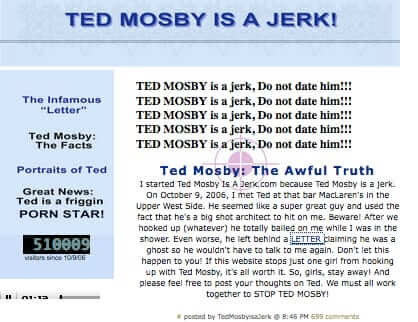
“Your reputation precedes you,” has never been truer than today, especially for businesses, given the Internet and online reputation. And most especially because the Internet persists. With millions of people taking to Yelp, Google Reviews, Amazon reviews, and more, it’s not surprising that businesses are worrying more than ever about online reputation management, and paying for online reputation management tools.
But, is it really possible to manage your online reputation?
The bottom line is that the best online management reputation tool – the best way to manage your online reputation – is to deserve a good reputation, both on and offline. Otherwise, how can you possibly hope to keep up with your online reputation with the likes of Yelp, Google Reviews, and more?
Of course, there are services that claim they will manage your online reputation, and that they will remove any negative reviews you may garner, but, as we said, the Internet persists. (Which is more than we can say of some of these online reputation management outfits. Take RatePoint, for example, whose own reputation – at least with us – left something to be desired. When an online reputation management company does things to damage their own online reputation, you have to wonder. RatePoint, by the way, closed their doors a year later.)
Current online reputation management services include ReputationDefender and StarMax, both of which claim to help you manage your online reputation.
The Internet Patrol is completely free, and reader-supported. Your tips via CashApp, Venmo, or Paypal are appreciated! Receipts will come from ISIPP.
But do they really? Well, it depends on what you mean. According to Reputation Defender’s own site, they really can’t do anything about negative reviews and other negative online reputation. In fact, they advise:
“Avoid visiting negative sites. If something misleading or defamatory appears online, resist the urge to visit it. The more traffic you send to negative sites, the more authoritative they look to search engines.
Deleting is impossible. Short of hacking into the offending site, there’s no effective way to delete sites you don’t like. Reputation management is not about sweeping issues under the rug, it’s about building a strong positive reputation.
Don’t bother with take-down requests. It is extremely rare that an online reputation problem can be handled by having your lawyer write a cease-and-desist letter to the website owner. Legally speaking, the website is not usually required to comply, and even if it does, it’s extremely easy for the original poster (or someone else) to republish the material on any number of new sites.”
And they’re not wrong.
(Curiously, in her 2012 book I Know Who You Are and I Saw What You Did: Social Networks and the Death of Privacy, author Lori Andrews points out that “Reputation.com charges $14.95 per month for a detailed monthly report that indicates what is being said about you online and $29.95 for each item you want removed from the Web, with no guarantee of success.” Perhaps between 2012 and now they have removed that particular offering from their stable.)
Similarly, StarMax advises that “It is very difficult to get negative reviews written about your business removed from any review site. There are a few exceptions such as outright slander and salacious content. There are some reputation management companies that have claimed that they can remove them for you because of “loopholes” or “legal means” that they use to get them taken off. The majority of these cases is simple not true and is a waste of money and time in doing so. The most effective way to remove the influence of negative reviews is to have a large quantity of positive reviews that either push the negative reviews on to the following page or simply overwhelm negative ones with a bunch of positives.”
So if even these online reputation management services say that it’s not really possible to remove negative online reviews and other negative online reputation hits, then what are they selling you?
See that last line in StarMax’ paragraph above?
“…overwhelm negative ones with a bunch of positives.”
What they are selling you, in varying degrees, is (at best) support services to help you increase your legitimate positive reviews or, at worst, they are selling you actual reviews. (See our article on How to Make Sure You’re Not Reading Fake Reviews on Yelp, Expedia, Trip Advisor, and Other Review Sites.)
ReputationDefender’s services include having a team of writers take information from you and create content to make you look great in social media and articles. “You supply the raw information you want to have discussed via our online dashboard, and our editorial team works from that material. You can also have information directly imported from your LinkedIn account.”
Then, says Reputation.com of the ReputationDefender service:
– We go over your goals and objectives together, developing an engagement strategy specific to your situation
– Our editorial team begins creating positive, truthful content about you
– You review all content we create and give the go-ahead for publication
– We strategically publish these new materials online and optimize them for maximum impact
– This ecosystem of positive content pushes up the search results you like
– Negative search results get demoted to lower positions where they’re less visible
None of this is rocket science, and it’s all things that you can do for yourself. But enough people are freaked out about online reputation (or at least enough venture capitalists are banking on them so being) that ReputationDefender has, so far, raised $60 million in VC funding.
And speaking of those negative search results, remember how we mentioned that the Internet persists? In fact, the Internet has an elephantine memory. And thanks to Google, and sites such as the The Wayback Machine at the Internet Archive.org, the Internet has a long memory indeed.
Yelp Review from 2005 Retrieved in 2016
Now, we supposed that one can be forgiven for not really thinking about one’s online reputation back in 2005. But there is really no excuse for it in 2013.
Let alone in 2015.
Of course, it’s not just businesses that need to be concerned about their online reputation. As an individual, if you are ever going to apply for a job or school, or, hey, go out on a date, you have to know that future employers, schools, and mates will be Googling you, and judging you based on your online reputation.
Hell Hath no Fury Like a Woman with Internet Access Scorned
So just how can you manage your online reputation?
Well, if you don’t have (much of) one yet, then the answer is easy: treat people well.
Sure, there will always be that grinch who will take exception to the colour of your shirt, or the way you looked at them, and post something negative. But overwhelmingly, if you show your customers the love, they’ll show you the love. If you treat people well, they will treat you well.
Plus, if you aren’t currently being hurt by a negative online reputation, don’t go looking for those negative things. Because what that one grinch says will eat at you, and it’s really not that important. Concentrate on building a good reputation. Not a ‘good online reputation’. A good reputation, period. Because if you do that, it will translate to a good online reputation as well.
If you want to read more about online reputation management (especially if you are now trying to rehabilitate a negative online reputation), we highly recommend this article by KissMetrics, and for a more (very) in-depth how-to for boosting and rehabilitating your online reputation, see Outspoken Media’s Online Reputation Management Guide.
The Internet Patrol is completely free, and reader-supported. Your tips via CashApp, Venmo, or Paypal are appreciated! Receipts will come from ISIPP.













